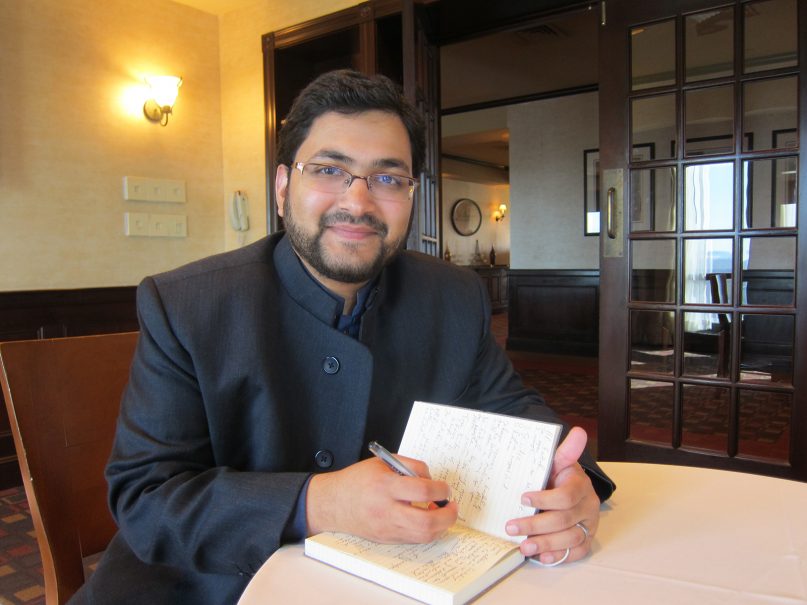(Interfaith America) — Imam Sohaib Nazeer Sultan, Princeton University’s Muslim chaplain and beloved interfaith leader, died Friday (April 16) at sunset after a yearlong battle with a rare and aggressive form of cancer at age 40. He was surrounded by his family while hearing recitations of the Quran and prayers offered in his honor.
In a Facebook post, his wife, Arshe Ahmed, shared the news of her husband’s death: “Sohaib Sultan has passed away peacefully on this beautiful, blessed Friday Jummah day around maghrib time in this most beautiful month of Ramadan. The month of the Qur’an…Sohaib LOVED the Qur’an. He has returned to his Creator.”
MORE: Facing changing spirituality on campus, historic chaplain groups merge
A public lecturer and writer on Islam, Sultan was greatly revered for his compassionate outlook on life inspired by his faith. He was known for his interfaith leadership in higher education, and as an active bridge-builder between Muslims and other faith communities.
“I had the singular honor of hiring Imam Sultan to his position at Princeton,” said the Rev. Paul Raushenbush, a former associate dean of religious life at Princeton. “Sohaib brought his kind heart, deep spirit and welcoming smile into every room, and made life better at Princeton not only for Muslims but for every student, staff and faculty member. His presence in my life was a gift that I am forever grateful for.”
Sultan was a graduate of Hartford Theological Seminary and was the first Muslim chaplain at Trinity College in Hartford, Connecticut. He was one of eight people profiled in the 2010 PBS documentary series “The Calling,” about the spiritual journey of people from Jewish, Christian and Muslim faiths who chose a life in the clergy.
He was the author of “The Koran for Dummies,” published in 2004, and “The Qur’an and Sayings of Prophet Muhammad: Selections Annotated and Explained,” published in 2007.

Imam Sohaib Sultan, right, with his wife, Arshe Ahmed, and daughter, Radiyya. Photo via LaunchGood
Donna Auston, a Muslim and an anthropologist, wrote on Facebook, “Over the course of his tenure at Princeton University, he built a beautiful, extended community and demonstrated in so many ways every day what spiritual leadership is supposed to look like: kind, smiling, soft, loving — but also humble, curious, deeply sensitive and always nudging all of us towards intellectual and emotional growth.”
Less than a month before his death, Sultan joined Vineet Chander, coordinator for Hindu life and Hindu chaplain at Princeton University, for a conversation titled “Living and Dying With Grace,” on the philosophies of living life and approaching death from their individual faiths, which has attracted more than 2,300 views on YouTube.
“Since April 2020, Sohaib and I had been having fortnightly (or however regularly his strength allowed) phone conversations. These were unscripted and informal conversations without an agenda — just friend to friend, colleague to colleague,” said Chander.
“But because we both are so informed by our theologies and enjoy discussing theology, the conversations organically became very theological in flavor,” he added. “Soon I started to feel a little selfish hoarding all this wisdom and beautiful realization I was hearing from Sohaib.”
Sultan said in the YouTube conversation that there is a rahmat (grace or mercy) in accepting death: “Nobody wants to leave this world, there are too many attachments. … Whether you’re 40, or 80, or 120, you never want to leave, but at some point, you’ve to leave. … That is the way God has decreed the world to be.”
Later, he raised his hands in prayer and recited, “O God, Guide us at this moment that is upon us, a moment of darkness for humanity, a moment of great injustice and wickedness and oppression that humanity faces from the ways in which we engage in race wars and poverty and homelessness. O God, protect us from that, O God, protect us from that, O God, protect us from that, remove us from that, and show us the better way, show us the way of peace, show us the way of tolerance.”
MORE: For interfaith couples, Ramadan can deepen ties to faith and each other
You can watch the full conversation on YouTube here.
This story was published in partnership with Interfaith America, a website of Interfaith Youth Core.





